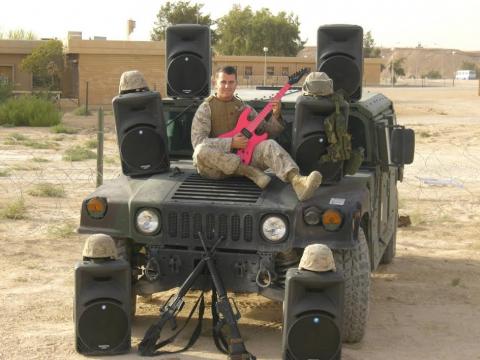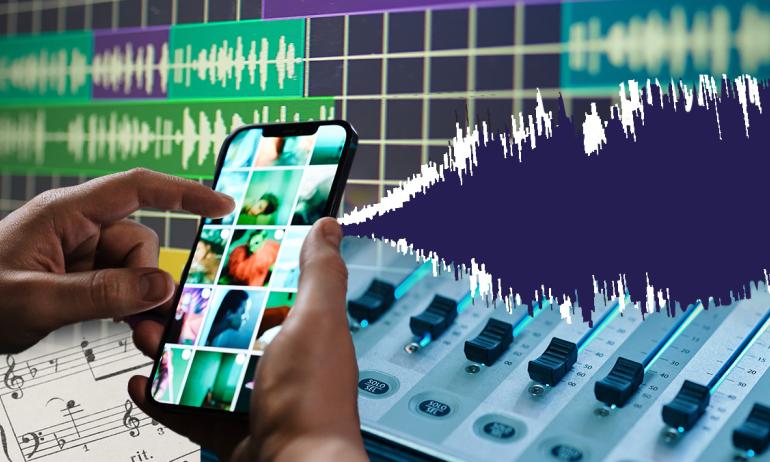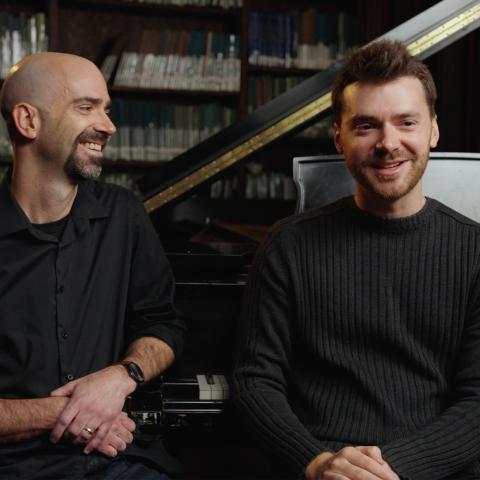Soldiers and Veterans Pursue Art and Degree Online

Andrew Bonica B.M. '15 finished his first Berklee Online certificate program while deployed in Iraq.
Image courtesy of Andrew Bonica
In the Iraqi desert in 2004, in between shifts at a small outpost the Marines established at an abandoned train depot to refuel planes, Lance Corporal Andrew Bonica was able to occasionally grab a few minutes on a spotty internet connection and plug into life back home.
During one of this portal’s brief openings, Bonica came across a guitar magazine that featured an ad for BerkleeMusic.com, the predecessor to Berklee Online, the college’s online extension school.
He had taught himself to play guitar when he was in middle school in Hudson, a village in the marchlands of Greater Boston, and had always wanted to go to Berklee for college but considered it a fantasy. Instead, he enrolled in the Marines, 17 days before September 11, 2001.
But in a tent in Iraq, looking at that ad, Berklee seemed more accessible than ever.
“Sitting out there in the desert in the fog of war you gain perspective and clarity,” Bonica says. “You get a lot of time to think. It’s not always rockets and bullets and explosions… And as much as I loved what I was doing I realized that it wasn’t my number one passion.” He made a decision: as soon as he got out of that war, he was going to enroll and start a new career.
Now under the lucent California sun, and several certificate and degree programs later, Bonica works as a product manager at Yamaha Guitar Group, or, as he calls the post, “my dream gig.”
"I mean, here I am, in my dream job. I’ve got an office with a window and a door and guitars hanging all around me, and I couldn’t be happier.”—Andrew Bonica B.M. '15
He had made good on his promise to himself in Iraq and enrolled in Berklee’s online Specialist in Recording and Production for Guitars with Pro Tools certificate program. He finished it while redeployed to Iraq in 2005, even though it meant hours waiting in line for 15 minutes of internet time. He went on to get a professional certificate in electronic music production and sound design, a master’s certificate in music production and technology, and eventually a bachelor’s degree in music production, all from Berklee. He’s since gone on to earn bachelor’s and master’s degrees in engineering from National University.
An Education Fit for Deployment
While Bonica’s prolificity might be unusual, his having been a soldier studying with Berklee Online is not. Ten percent of Berklee Online’s degree students, or over 160, are active duty or reservist service members, or veterans. More than half of them are enrolled in the Interdisciplinary Music Studies program, and a large percentage are also in the Music Production degree program. Many more are working toward a professional certificate or are taking individual classes.
Soldiers often don’t know when and where they will be deployed next, making study at a brick-and-mortar college difficult. One of the major benefits of studying with Berklee Online is being able to stick with the same program, whether from Iraq or stateside.
Naval aircrewman Rene Hammel is pursuing her degree through Berklee Online.
Image courtesy of Rene Hammel
Direct Access to Faculty
But taking on a degree program while being a full-time soldier has its challenges. Rebekah Hastings, who recently finished her five-year commitment, said that while she learned “a ton of good, usable information,” getting up very early in Alaska to make chats on weekends was tough. Still, she says, learning music from the comfort of her home was one of the best aspects of the program.
For Bonica, one of the highlights was his access to the faculty, and not just the graduate teaching assistant, and personalized attention. “I can message the instructor directly, I can go rewatch video lectures, I can really dig deep into the material.” And he can do this at his leisure, without having to tailor his schedule to a faculty member’s office hours.
“As long as you’re disciplined and motivated and you commit to the program, then I think it can work wonders for people and get them off to the dream career that they’re searching for,” Bonica says. “I mean, here I am, in my dream job. I’ve got an office with a window and a door and guitars hanging all around me, and I couldn’t be happier.”




